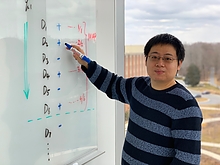Harnessing Data Science to Improve the Social Good

Poverty, health care and climate change are just a few of the many challenges facing the world today. Instead of supporting these causes on an individual level, what if you could influence people to effectively contribute to a solution en masse?
That’s the goal of data scientist Wei Ai, an assistant professor in the College of Information Studies (iSchool). Ai uses machine learning techniques to run real-world experiments that influence people to act in the best interest of society.
The applications for his research are broad, such as incentivizing people to live healthier lifestyles, contribute more money to charity (think UMD’s annual Global Giving Tuesday) and participate in open source platforms.
Ai, who has an appointment in the University of Maryland Institute for Advanced Computer Studies (UMIACS), uses three main techniques in his research. The first is casual inference, like his theory that social identity effectively promotes positive behavioral changes—something he has proved in separate studies and contexts.
Based on those insights, Ai builds recommender systems, a valuable machine learning application, to maximize the efficiency of his campaign. Finally, he relies on field experiments to verify and validate his approaches.
Ai’s ardent about contributing to the alleviation of poverty through microfinancing. For a large-scale study he teamed up with Kiva.org, a nonprofit crowd-lending platform that matches lenders with low-income entrepreneurs who lack access to traditional bank loans.
First, he hypothesized that social identity on the platform could increase participation and prosocial lending. Then he built a recommender system to organize lenders into 40,000 virtual teams.
Lenders who competed in the experiment contributed significantly more money than those who did not participate, suggesting that this is an effective and low-cost behavioral mechanism to increase charitable contributions, says Ai.
In another study, he designed a virtual competition for drivers employed by Didi Chuxing (DiDi), China’s on-demand taxi calling platform that is similar to Uber.
These companies say that they struggle to retain drivers. Some studies found that only four percent of drivers remain at Uber after one year, says Ai. Drivers complain of several barriers to job satisfaction and retention, such as having few bonds with colleagues, no clear career path and a lack of a sense of achievement in their work.
To mitigate these problems and incentivize drivers to be more productive, Ai used a recommender system to optimally organize Didi’s 64,000 drivers into teams for virtual competitions across 143 Chinese cities.
On average, drivers increased both the length of their workday and number of trips by one-third, indicating the effectiveness of his strategy. This bump in productivity was also reflected in the drivers’ paychecks.
Similar to the drivers in his study, Ai’s first year at UMD has been isolating. He arrived shortly before the pandemic hit; therefore, the majority of his campus interactions have been limited. Yet he has found community virtually within the university’s Computational Linguistics and Information Processing (CLIP) Lab, which is part of UMIACS.
“I like CLIP for several reasons,” says Ai. “Not only is it a very good multidisciplinary lab, but the researchers share my passion of using language and processing tools to answer many of our real-world problems.”
Ai is constantly looking for new applications for his research. In health care, for example, he imagines identifying teams of doctors to improve chronic disease management, or using data science techniques to encourage people with high blood pressure to adapt healthier lifestyles.
However, teaching during the COVID-19 pandemic has brought education to the front and center of his attention.
“What approaches could we use to keep students more engaged?” Ai asks. “It could be teams or something else, but the current setting gives us an opportunity to think about new ways to improve student success.”
—Story by Maria Herd
